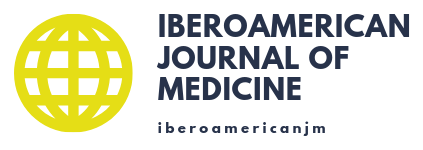Antiviral proteinase inhibitors of plant and animal origin
Valentina Divocha, Irina Komarevzeva
Abstract
Introduction: Over the past 10 years, much attention has been paid to the development of new antiviral drugs based on the suppression of the proteolytic activity of enzymes by trypsin inhibitors of plant and animal origin.
Material and methods: We used a trypsin inhibitor from barley, trielin- (isolated by employees of the Agro-Industrial Institute of Selection and Genetics of the Ukrainian Academy of Sciences from the salivary glands of a dog); ovomukoid (isolated from duck eggs by employees of N, I, Bach Research Institute of Biology, Russian Academy of Sciences); Influenza virus APR 8/34 (fourth passage), adapted to the lungs of mice at a dose of 20 LD /0.1 ml, titre HA( hemagglutenin) 1:32) ,white BALB/c mice weighing 12-14 g. Infection with influenza virus and treatment with inhibitors was carried out intranasally under light ether anesthesia. Doses studied were: 0.5mg/ml; 2.5 mg/ml; 5.0 mg/ml; The treatment regimen of 10 mg/ml differed only in the initial stages (1 hour before infection, during infection and 1 hour after infection, and then 6 hours after infection, 24 hours after infection, 48 hours after infection, 72 hours after infection and 96 hours after infection).
Results and discussion: We found that an in vivo inhibitor from barley at a dose of 10 g/l delayed the development of influenza for 8 days. The ovomukoid possessed only prophylactic properties at a dose of 100 gamma / ml. With an increase in dose, it was toxic to animals. Trielin at a dose of 10 g/l had a pronounced therapeutic effect in influenza and was not toxic. The presence of hemagglutinin influenza virus in the lungs of treated mice was observed only on the 10th day after infection; 40% of the animals remained alive for 14 days (observation period).
Keywords
References
1. Shcherbinskaya AM, Rudenko AO. Prevention of influenza and acute respiratory diseases. Journal of the Practitioner. 1997;1:4-5.
2. Calfee DP, Hayden FG. New approaches to influenza chemotherapy. Neuraminidase inhibitors. Drugs. 1998;56(4):537-53. doi: 10.2165/00003495-199856040-00003.
3. Foster DA, Talsma A, Furumoto- Dawson A, Ohmit SE, Maqrguiles JR, Arden NH, et al. Influenza Vaccine effectiveness in preventing hospitalization for pneumonia in the elderly. Am J Epidemiology. 1992;136(3):296-307. doi: 10.1093/oxfordjournals.aje.a116495.
4. von Inzstein M, Wu WY, Kok GB, Pegg MS, Dyason JC, Jin B, et al. Rational desing of potent sialidase-based inhibitors of influenza virus replication. Nature. 1993;363(6428):418-23. doi: 10.1038/363418a0.
5. Punin AA, L’iakov Mlu, Farashchuk N, F. The content of free and bound water by the water fraction and the adhesive properties of sputum in patients with acute focal pneumonia. Terk Arkh. 1991;63(3):37-9.
6. Bukrinskaya AG. Molecular biology of viruses, part 1. 1983:4-20.
7. Divocha VA, Lagoda OV, Gozhenko AI. Modern approaches in the prevention and treatment of influenza: prospects for the use of proteolysis inhibitors. Bulletin of St. Petersburg State University. 2013; 11(2):170-84.
8. Aoki N. Alfa2 plasmin inhibitor. Nihon Ketsueki Gakkai Zasshi. 1978;41(3):584-8.
9. Divocha VA, AG Bukrinskaya, Grigoryeva IA. Change in protease activity in the lungs of mice infected with influenza A virus. Questions of Virolog. 1990;5:370-7.
10. Synovets AS, AP Levitsky. Inhibitors of Proteolytic Enzymes in Medicine, Kiev. 1985.
11. Veremeenko KN. Enzymes in otolaryngology. Kiev, 1980.
12. Vovchuk SV. Determination of the activity of proteolytic enzymes in cereal crops. In: Vovchuk SV. Biochemical methods for the study of breeding material: collection. scientific work. Odessa;1979:54.
13. Levitsky AP. Methods for the determination of trypsin inhibitors. In: Levitsky AP. Biochemical methods for the study of breeding material collection scientific work. Odessa;1979:68-73.
14. Patent 56689 Ukraine, IPC (2011.01), А 61В 10/00. The way of visualizing the activity of trypsin-like proteases. Divocha VP, Mikhalchuk VM.; Applicant and patent holder Dіvocha VP, Mikhalchuk VM. –U 2010 07856 claimed 23.06. 2010; publ. 01/25/2011, Bull. nº 2.4.
15. Lowry WJ, Baker F. Protein measurement with the Folin reagent. J Biol Chem. 1951;193:265-75.
16. Divocha VA, Mikhalchuk VN, Gozhenko AI. Molecular and biological substantiation of influenza antiproteinase therapy of influenza. J Acad Med Scien Ukr. 2009;15(1):19-21.
17. Dіvocha VP. Biological and virological analysis of antiprotein therapy therapy: an abstract of a dissertation on the medical science level of a doctor of medical sciences. Kyiv. 2009:42.
18. Patent 21599 Ukraine, IPC (2006). A 61 K 36/00. Method of view of the trypsin-resistant protein synthesis from the collection of gamma globulin and the albumin of donated blood / Divocha VP, Mikhalchuk VM, Gozhenko AI; Applicant and patent holder Divocha VP, Mikhalchuk VM, Gozhenko AI.-No. u 2006 11233; Declared on October 25, 2006; publ. March 15, 2007, Bull. nº 3.
19. Weis W, Brown JH, Cusack S, Paulson JC, Skehel JJ, Wiley DC. Structure of the influenza virus hemagglutinin complexed with its receptor, silica acid . Nature. 1988;333(6172):426-31. doi: 10.1038/333426a0.
20. Scholtissek C. Influenza A viruses with noncleaved hemagglutinin are not internalised after adsorbtion. Brief report. Arch Virol. 1986;90(1-22):159-63.
21. Shahrour N. The role of neuraminidase inhibitors in the treatment and prevention of influenza . J. Biomed Biotechnol. 2001;1(2)89-90. doi: 10.1155/S111072430100016X.
22. Kolobukhina LV, Merkulova LN, Burtseva EI, Isaeva EI, Shchelkanov MIu, Beliakova NV, et al. The effectiveness of oseltamivir (Tamiflu)in adult influenza on the epidemic rise of morbidity in Russia in the 2006 -2007 season. Vopr Virusol. 2008;4:23-7.
23. Veremeenko KN, Holoborodco OP, Kizim AI. Proteolysis in normal and in pathology. Kyiv. 1988:200.
24. Patent 23548 A 61 K 35/00. The method of obtaining an inhibitor of trypsin-like proteinases / Divocha V.A .; Applicant and patent holder Divocha V.A.- No. 97052520; application 05/30/97; publ. 02.06.98.
Submitted date:
01/08/2020
Reviewed date:
02/08/2020
Accepted date:
03/09/2020
Publication date:
03/09/2020

